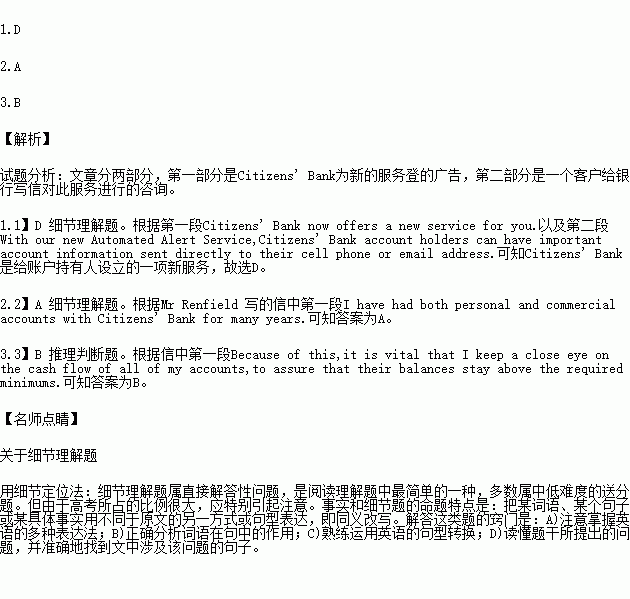题目内容
B
STAY INFORMED WITH CITIZENS,BANK! Are you a busy person who likes to stay on top of your finances? Then why do you waste your time constantly checking your bank account? Citizens' Bank now offers a new service for you. With our new Automated Alert Service,Citizens' Bank account holders can have important account information sent directly to their cell phone or email address.The type of information you'll receive is up to you; ●Be informed when your account balance drops below a certain level. ●Receive notification (通知)when a specific check clears. ●Find out instantly whenever a withdrawal is made. And at the end of the month,your complete bank statement will still be sent to you.With Automated Alerts,staying on top of your banking will be a lot easier.For more information,contact us at aas@citizensbank.net or drop by your nearest branch. |
From;Robert Renfield robertyaho@nemo.com To:Citizens' Bank aas@citizensbank.net Subject;An Inquiry of the Alert Service Good afternoon, I am writing to request more information on your new Automated Alert Service,as advertised on your Website.I have had both personal and commercial accounts with Citizens' Bank for many years.Often,I find it necessary to move money between accounts.Because of this,it is vital that I keep a close eye on the cash flow of all of my accounts,to assure that their balances stay above the required minimums.Therefore,I have been searching for an economical means of keeping better track of my finances.I was considering purchasing software for this purpose,but I think that your new service might be a convenient alternative. My first question concerns the timeliness of the notifications.When you say “instantly,” does that relate only to banking hours? For example,if my wife were to use our debit card (借记卡)on a Sunday afternoon to make a transfer (转账)at an ATM,would I be informed via email instantly or on Monday morning? My second question is in regard to the information available in this service.Is it possible to be aware of any information in my monthly bank statement,such as interest on my savings account? Finally,I would like to know the cost of this service. Please send me this information as soon as possible.If necessary,you can contact me in the evenings at 225-782-0902. R.Renfield |
1.What is Citizens' Bank advertising?
A.A kind of checking account.
B.A way to bank over the phone.
C.A free hotline for new customers.
D.A service for account holders.
2.What is Mr Renfield's relation to Citizens' Bank?
A.He has had accounts with it for many years.
B.He is a member of its board of directors.
C.He recently opened a new account with it.
D.He used its Automated Alert Service.
3.Which of the following will be most important for Mr Renfield?
A.Receiving information directly on his cell phone.
B.Knowing when his balances drop to a certain level.
C.Being informed when a specific check clears.
D.Having his monthly bank statement sent to him.
 天天向上一本好卷系列答案
天天向上一本好卷系列答案 小学生10分钟应用题系列答案
小学生10分钟应用题系列答案
